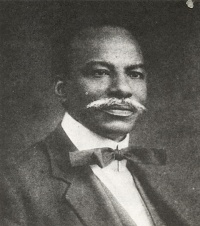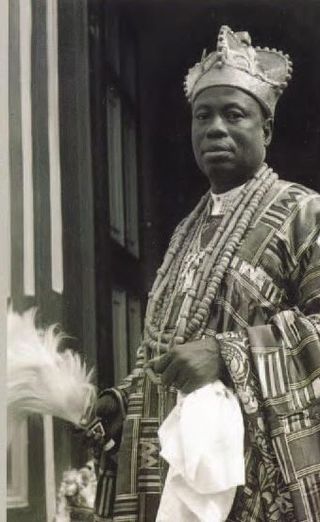Related Research Articles

Nnamdi Benjamin Azikiwe, PC, usually referred to as "Zik", was a Nigerian statesman and political leader who served as the ceremonial first president of Nigeria during the First Nigerian Republic which existed from 1963 to 1966. Considered a driving force behind the nation's independence, he came to be known as the "father of Nigerian nationalism".

Northern Nigeria was a British protectorate which lasted from 1900 until 1914 and covered the northern part of what is now Nigeria.

Southern Nigeria was a British protectorate in the coastal areas of modern-day Nigeria formed in 1900 from the union of the Niger Coast Protectorate with territories chartered by the Royal Niger Company below Lokoja on the Niger River.
The Nigerian Youth Movement (NYM) was Nigeria's first genuine nationalist organization, founded in Lagos at Stanley Orogun, with Professor Eyo Ita as the founding father and many others, including Samuel Akisanya. Ernest Ikoli, the first editor of the Daily Times of Nigeria, which was launched in the month of June 1926, was another founding member. Immediate concerns included the supposedly inferior status of Yaba College, appointments of Africans to senior positions in the civil service and discriminations against the African truck drivers. However, the Lagos-based organization at first, has generally moderate views and pledged to support and co-operate with the governor. The president was Dr Kofo Abayomi. Ernest Ikoli was vice president and H.O. Davies was the secretary. It was the first multi-ethnic organization in Nigeria and its programme was to foster political advancement of the country and enhance the socio-economic status of the Nigerian citizens. Adeyemo Alakija later became President of the NYM.
The National Council of Nigeria and the Cameroons (NCNC) later changed to the National Convention of Nigerian Citizens, was a Nigerian nationalist political party from 1944 to 1966, during the period leading up to independence and immediately following independence.

Olayinka Herbert Samuel Heelas Badmus Macaulay was a Nigerian nationalist, politician, surveyor, engineer, architect, journalist, and musician and is considered by many Nigerians as the founder of Nigerian nationalism.

Colonial Nigeria was ruled by the British Empire from the mid-nineteenth century until 1960 when Nigeria achieved independence. British influence in the region began with the prohibition of slave trade to British subjects in 1807. Britain annexed Lagos in 1861 and established the Oil River Protectorate in 1884. British influence in the Niger area increased gradually over the 19th century, but Britain did not effectively occupy the area until 1885. Other European powers acknowledged Britain's dominance over the area in the 1885 Berlin Conference.

Babatunji Olowofoyeku, OFR, SAN, was a Nigerian politician, educationist, lawyer and leader, a Yoruba and native of Ilesha in Osun State of Nigeria, whose political career started in the mid-1950s.

Samuel Akisanya, was a Nigerian trade unionist and nationalist based in Lagos, Nigeria during the colonial era, one of the founders of the Nigerian Youth Movement. He was also the Oba of Isara, an office which he held from 1941 until his death. He is today widely regarded as the greatest king in the history of the city.

Nigerian nationalism asserts that Nigerians as a nation should promote the cultural unity of Nigerians. Nigerian nationalism is territorial nationalism and emphasizes a cultural connection of the people to the land, particularly the Niger and the Benue Rivers. It first emerged in the 1920s under the influence of Herbert Macaulay, who is considered to be the founder of Nigerian nationalism. It was founded because of the belief in the necessity for the people living in the British colony of Nigeria of multiple backgrounds to unite as one people to be able to resist colonialism. The people of Nigeria came together as they recognized the discrepancies of British policy. "The problem of ethnic nationalism in Nigeria came with the advent of colonialism. This happened when disparate, autonomous, heterogeneous and sub- national groups were merged to form a nation. Again, the colonialists created structural imbalances within the nation in terms of socio-economic projects, social development and establishment of administrative centres. This imbalance deepened the antipathies between the various ethnic nationalities in Nigeria ." The Nigerian nationalists' goal of achieving an independent sovereign state of Nigeria was achieved in 1960 when Nigeria declared its independence and British colonial rule ended. Nigeria's government has sought to unify the various peoples and regions of Nigeria since the country's independence in 1960.

The Saro, or Nigerian Creoles of the 19th and early 20th centuries, were Africans that were emancipated and initially resettled in Freetown, Sierra Leone by the Royal Navy, which, with the West Africa Squadron, enforced the abolition of the international slave trade after the British Parliament passed the Slave Trade Act 1807. Those freedmen who migrated back to Nigeria from Sierra Leone, over several generations starting from the 1830s, became known locally as Saro(elided form of Sierra Leone, from the Yoruba sàró). Consequently, the Saro are culturally descended from Sierra Leone Creoles, with ancestral roots to the Yoruba people of Nigeria.

Sir Kitoye AjasaListen was a Nigerian lawyer and legislator during the colonial period. He was conservative, and worked closely with the colonial authorities. He thought that progress would only be possible if Africans adopted European ideas and institutions. Ajasa was one of the leaders of the People's Union, and was the founder of the conservative newspaper the Nigerian Pioneer. He was the first Nigerian to be knighted.

Chief Theophilus Owolabi Shobowale Benson, S.A.N. was a Nigerian lawyer who became one of the most prominent Yoruba politicians in the period leading up to Nigerian independence in 1960. He served as the Minister of Information, Broadcasting and Culture in the first post-independence government. Benson was imprisoned for several months after the first military coup of 1966. He returned to practice as a barrister, and was recognised as a prominent Yoruba chief.
John Payne Jackson was an Americo-Liberian journalist, born in Liberia who was influential in Lagos, Nigeria around the turn of the 20th century. He edited and published the Lagos Weekly Record from 1891 until his death. This was a well-written and informative paper that discussed and analysed current events. It took an anti-colonialist, African nationalist position that made it unpopular with the authorities and also with some of the Nigerian elite.
Richard Akinwande Savage (1874–1935) was a prominent physician, journalist and politician in Lagos, Nigeria during the colonial era.
John Randle was a West African doctor who was active in politics in Lagos, now in Nigeria, in the colonial era. Born in Sierra Leone, he was one of the first West Africans to qualify as a doctor in the United Kingdom. On return he worked for the Lagos Colony colonial medical service for a while, then left due to discrimination and built up a successful private practice, treating both Europeans and Africans. He co-founded the People's Union in 1908, a political association that sometimes opposed government measures. During World War I (1914–18) he was loyal to the British Empire. In post-war politics the conservative People's Union was not a serious competitor to the more radical Nigerian National Democratic Party.
Orisadipe Obasa,Listen was a Nigerian doctor and prince who played a significant role in the politics of Lagos in the first decades of the 20th century.
Oba Eshugbayi Eleko, alias "Eleko of Eko", was the Oba of Lagos from 1901 to 1925, and from 1931 to 1932. His father was Oba Dosunmu. Eleko's struggles and legal victory over the British colonial government symbolized the struggle between indigenous rights and colonial rule in Nigeria. The outcome of the "Eleko Affair" led to the Eleko's deposition as Oba and deportation to Oyo between 1925 and 1931, years that some historians now call the "interregnum years", and that saw the reigns of Oba Ibikunle Akitoye and Oba Sanusi Olusi.

Oba Sir Musendiku Buraimoh Adeniji Adele II, KBE was the Oba (King) of Lagos from 1 October 1949 to 12 July 1964.
Moses Da Rocha was a Nigerian medical doctor, journalist and politician. He was among a number of medical doctors such as Africanus Horton, Orisadipe Obasa and John K. Randle who combined medical practice and politics. He founded the Union of Young Nigerians in 1923 just before the elections into the Legislative Council.
References
- 1 2 3 4 George 2014, p. 1910.
- ↑ Ayandele 2005, p. 157.
- 1 2 3 4 Ayandele 2005, p. 158.
- 1 2 Coleman 1965, p. 180.
- ↑ Keazor 2014.
- 1 2 3 4 Adeloye 1974, p. 279.
- 1 2 3 Sklar 2004, p. 48.
- 1 2 3 Awa 1964, p. 95.
- 1 2 Sherwood 2014, pp. 125–126.
- 1 2 3 Sherwood 2014, p. 126.
- ↑ Sklar 2004, p. 45.
- 1 2 3 Sherwood 2014, p. 127.
- ↑ Azikiwe 1961, p. 304.
- ↑ Awa 1964, p. 94.
- ↑ Adeloye 1974, p. 287.